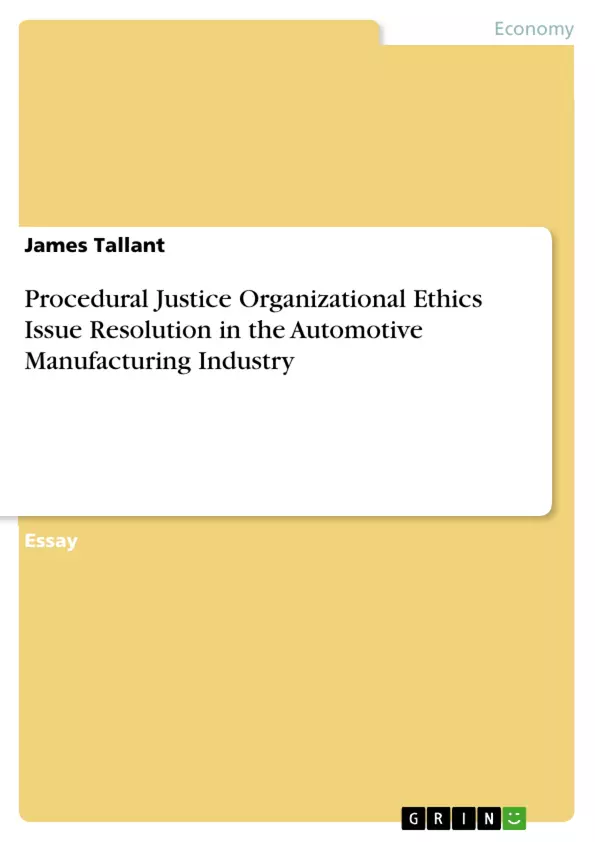Procedural Justice: Organizational Ethics Issue Resolution in the
Automotive Manufacturing Industry
Businesses and organizations face difficult ethical decisions daily. With the advent of a global economy, U.S. companies face difficult decisions on how to remain competitive in the new larger global economy. Often organizations face the difficult ethical issue of laying off U.S. workers and outsourcing those jobs to foreign countries. The U.S. manufacturing industry, especially the automobile manufacturers has had a difficult time remaining competitive in the world market. For example, the big three U.S. automobile manufacturers, Dodge, Ford, and General Motors all have had to close plants, layoff employees, and move operations overseas by outsourcing to remain competitive. Outsourcing jobs is a difficult ethical question and issue. However, by following the steps of the procedural justice process which is “a deliberate systematic decision-making process that can help you promote ethical standards of practice and ensure ethical conflicts are appropriately addressed” (Nelson, 2005, p.1, ¶1). Six main steps of the procedural justice process will be discussed as it relates to outsourcing of jobs: (1) Issue clarification, (2) Stakeholder analysis, (3) Values identification, (4) Issue resolution,
(5) Addressing objections, and (6) Resolution implementation.
Table of Contents
- Issue Clarification
- Stakeholder Analysis
- Values Identification
- Issue Resolution
- Addressing Objections
- Resolution Implementation
Objectives and Key Themes
This paper explores the ethical challenges faced by automotive manufacturers in a globalized economy, specifically focusing on the issue of job outsourcing. The author analyzes the application of procedural justice principles in resolving this ethical dilemma, providing a step-by-step framework for decision-making.
- Ethical decision-making in a globalized business environment
- Procedural justice as a framework for resolving ethical dilemmas
- Stakeholder analysis and value identification in ethical decision-making
- The ethical considerations surrounding job outsourcing in the automotive industry
- The importance of transparency and communication in ethical conflict resolution
Chapter Summaries
The paper delves into the issue of job outsourcing by U.S. automobile manufacturers, examining its ethical implications through the lens of procedural justice.
- Issue Clarification: This section emphasizes the importance of clearly identifying the ethical question at hand and ensuring all stakeholders agree upon its ethical implications. The author uses the example of outsourcing to highlight the complex ethical considerations involved in balancing corporate profitability and worker well-being.
- Stakeholder Analysis: This part underscores the need for comprehensive stakeholder engagement, highlighting the diverse perspectives and interests at play in an outsourcing decision. Various stakeholders are identified, including financial officers, community representatives, employees, management, union leaders, legal counsel, governing board members, and ethics experts.
- Values Identification: This stage focuses on facilitating honest and sincere discussions among stakeholders, allowing them to express their value-driven perspectives on the ethical question. The author notes the contrasting viewpoints of employees, unions, community leaders, and the organization regarding job outsourcing.
- Issue Resolution: This section focuses on identifying potential solutions for resolving the ethical dilemma. The author explores alternative strategies to outsourcing and emphasizes the importance of considering all potential consequences, both short-term and long-term, before making a decision.
- Addressing Objections: This section explores the process of evaluating different solutions by systematically weighing their benefits and costs against the organization's mission and values. It also stresses the significance of transparency and justification in communicating the decision to stakeholders.
- Resolution Implementation: This final section emphasizes the need for clear and open communication once a decision has been made, advocating for town hall meetings and other forums to share the findings and decision with all stakeholders.
Keywords
This paper examines the ethical complexities of organizational decision-making, particularly in the context of outsourcing. The key themes revolve around procedural justice, stakeholder analysis, value identification, ethical conflict resolution, and transparency in organizational decision-making. The paper highlights the critical role of ethical considerations in a globalized business environment, particularly in the context of the automotive manufacturing industry.
What is procedural justice in organizational ethics?
Procedural justice is a systematic decision-making process used to address ethical conflicts and ensure that standards of practice are followed fairly and transparently.
Why is job outsourcing an ethical issue in the auto industry?
Outsourcing involves balancing corporate profitability and global competitiveness against the well-being and livelihoods of domestic workers and their communities.
What are the six steps of the procedural justice process?
The steps are: (1) Issue clarification, (2) Stakeholder analysis, (3) Values identification, (4) Issue resolution, (5) Addressing objections, and (6) Resolution implementation.
Who are the key stakeholders in an outsourcing decision?
Stakeholders include employees, union leaders, management, financial officers, community representatives, and governing boards.
Why is communication important in resolving ethical conflicts?
Clear and open communication, such as town hall meetings, ensures that the decision-making process is seen as fair and that all parties understand the justification for the final outcome.



